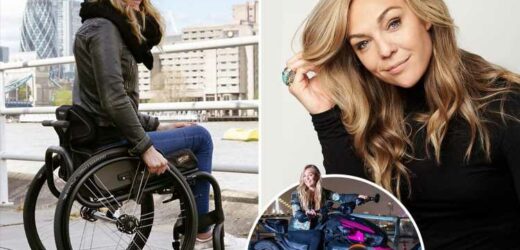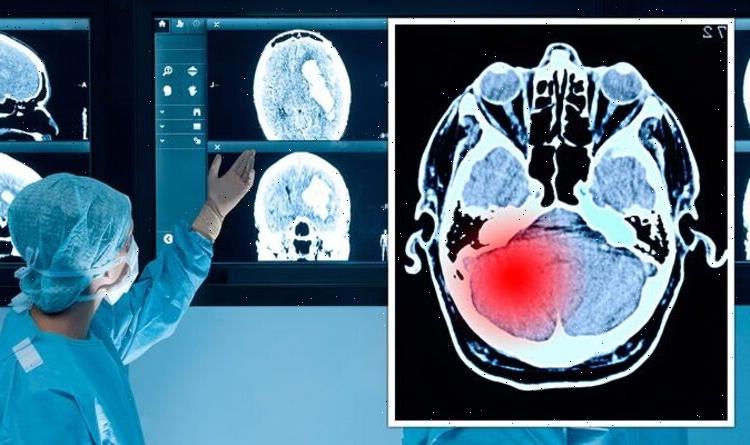FOR TV presenter Sophie Morgan, Covid lockdowns didn’t just mean she was out of work, it also marked a major milestone – one she never thought she’d celebrate, let alone write a book about.
“I'd lived at that point for 18 years non-disabled, and I'd also lived 18 years disabled,” says Sophie, 37.
And so, while everyone else was making banana bread, the Crowborough-born Crufts and Loose Women broadcaster began to write her story, out now, called Driving Forwards: A journey of resilience and empowerment after life-changing injury.
“I had a car crash when I was driving back from a party where I was celebrating my A level results,” recalls Sophie, who was 18 at the time and had a T6 spinal cord injury.
“I crashed the car because I was driving too fast and was out of control.
“I'd only had my licence a few months, so I wasn't particularly experienced and because the car was full of my friends I was a bit distracted and it was late at night, about 3 or 4 in the morning on country lanes – it was a perfect storm for a crash really.
Read more on health
Warning as norovirus on the rise in schools – the 6 signs you need to know
I got pregnant with an IUD again – how to make sure it doesn’t happen to you
“I lost control of the car and I damaged a lot of my face and also my spine.
“I was paralysed from the chest down, but my passengers were fine – apart from the trauma of it all, they were physically fine.”
We caught up with Sophie to talk health, wellbeing, and life after her crash…
You write that your mum admitted thinking if you were paralysed from the neck down and you didn't die, that she'd have to kill you anyway. Were you shocked by that?
I know what she's like and I think she wouldn't have wanted that fate for herself.
And I think she assumed that her daughter, knowing me as she did, that that would be something I wouldn't want to live with – those consequences of being so severely disabled.
Most read in Health
VIRAL SPREADWarning as Brits in hospital with flu rising – the 10 signs to watch out for
Covid hospitalisations 'plateau' as another 32,608 UK cases logged
I’m a paediatrician and here's why your little one is always sick
Covid or hay fever? How to spot the difference as pollen bomb explodes
It was one of those reactive, protective [feelings] – my mum wouldn't want to see me suffer so much.
But I also recognise that that is the perception many people would have; that being disabled is a fate worse than death.
And I've had people say to me, ‘I would kill myself if I was you, if I had a disability like yours’.
It is something people think we wouldn't want to live with, so I don't find it that shocking.
I find it quite telling of the kind of woman my mother is.
She's just very strong and she's very protective of me and she knows me better than anyone else.
But I also know that these are the sorts of conclusions people come to because we don't really see how the benefits of disability play out, we only see the negatives.
That's why I wrote the book, to start to explain to people that my situation and anyone's situation, paralysed from the neck down, paralysed from the chest down, paralysed from the waist down – any kind of disability – it's not as clear cut as you think.
It's not a dead end, it is not the end of your life.
I've met so many people over the years who have found that their disabilities make their lives into something more beautiful.
My mum’s reaction speaks to a wider issue of how we feel around disability.
What was it like looking back at some of your most painful memories?
It was really challenging, more than I had anticipated.
Looking back is something I don't often do.
The process of going through my diaries, trying to then tell the story as immersively as I possibly could, taking readers step by step how it felt in that moment – it was quite a challenge on that front.
But then, towards the end, it just felt incredibly healing and empowering.
How important is it that stories of people with disabilities are heard?
For anyone who has a physical disability, or recognises the feeling of being othered and unseen and ignored or belittled – it isn't a pleasant one, and I certainly felt, especially in the beginning, this rage in me.
I wanted to be seen the same as anybody else.
But now I have a drive to go into the nuances and the complexities of my specific disability because I think over the years, while the representation of disability and the visibility of disability has increased, what we don't really do is dig down into the ways in which our different disabilities impact our lives, we kind of get grouped together.
I think that we need to move those stories forward and show what different disabilities do to different peoples lives and explain those complexities – there's pros and cons to everything.
We need far more visibility of disabled people, we're certainly not there yet.
What do you want people to know about disability?
The way in which it turns your life upside down when it happens to you and the way it impacts your family, the way it impacts every single part of your life – but not just the negative consequences.
I'm quite strong about outlining the ways in which the negatives play out, all of the consequences of becoming paralysed in the negative sense, but also in a positive sense.
I really wanted to outline how it improved my life for the better and all of the things that I gained, the perspective, the relationships, a sense of purpose and meaning and all of those wonderful traits I gained.
It's about explaining the two sides of the coin.
How do you take care of your everyday health?
I'm a big fan of looking after my gut health and take Symprove, which is a probiotic, every day.
That's what sets me up. I have that as a routine every morning.
I eat at regular times and I try to sleep at regular times but to be honest work is so busy at the moment, that goes out the window.
What about exercise?
The exercise that I do is using a SkiErg, which is a really amazing piece of kit that allows someone who can't stand, someone like me, with a disability like mine, to be able to do really good cardio.
I occasionally do weights, but I do about half an hour or an hour of cardio two or three times a week and then the rest is my diet.
When it comes to looking after your mental health, what really works for you?
I draw. I paint. I sketch. I'm constantly using that as a tool whenever I'm a bit stressed out or a bit tired or a little bit angry or [feeling] any emotions that I don't quite know how to manage.
But I do it for fun as well, it's not medicinal or just catharsis; it's also really fun.
I listen to a lot of music. Music is my outlet really.
What about riding your specially adapted motorbike?
It's the best thing in the world. I can't put into words how much fun it is.
I love it. I don't ever want to get off it.
What impact do you hope your role on Loose Women will have?
With any of the work that I do, whether it's on Loose Women, Crufts, a travel show I am filming, my Channel 4 show, Living Wild: How to Change Your Life, they show different facets of my personality and that's really wonderful.
I'm so proud to be able to do that because I'm not just making shows around disability, I'm making programmes where my disability is slightly incidental.
I also don't shy away from it, but it feels like it's an authentic representation of what it looks like to just be someone like me.
I want to represent my community – we need far more representation of disabled people.
But I'm at a point in my career where I can see myself in my fullness – it's not just about me as disabled person, it's me being who I am.
Read More on The Sun
Fears sunken Russian warship carrying NUKES as Putin strikes back at Kyiv
Harry & Meghan visit Queen & Charles for ‘olive branch’ talks after Philip snub
Being on Loose Women and talking about things that have nothing to do with my disability is wonderful, but I also get a real joy being able to talk about disability issues on the panel too.
Driving Forwards: A journey of resilience and empowerment after life-changing injury by Sophie L. Morgan is out now, published by Sphere, priced £16.99.
Source: Read Full Article














